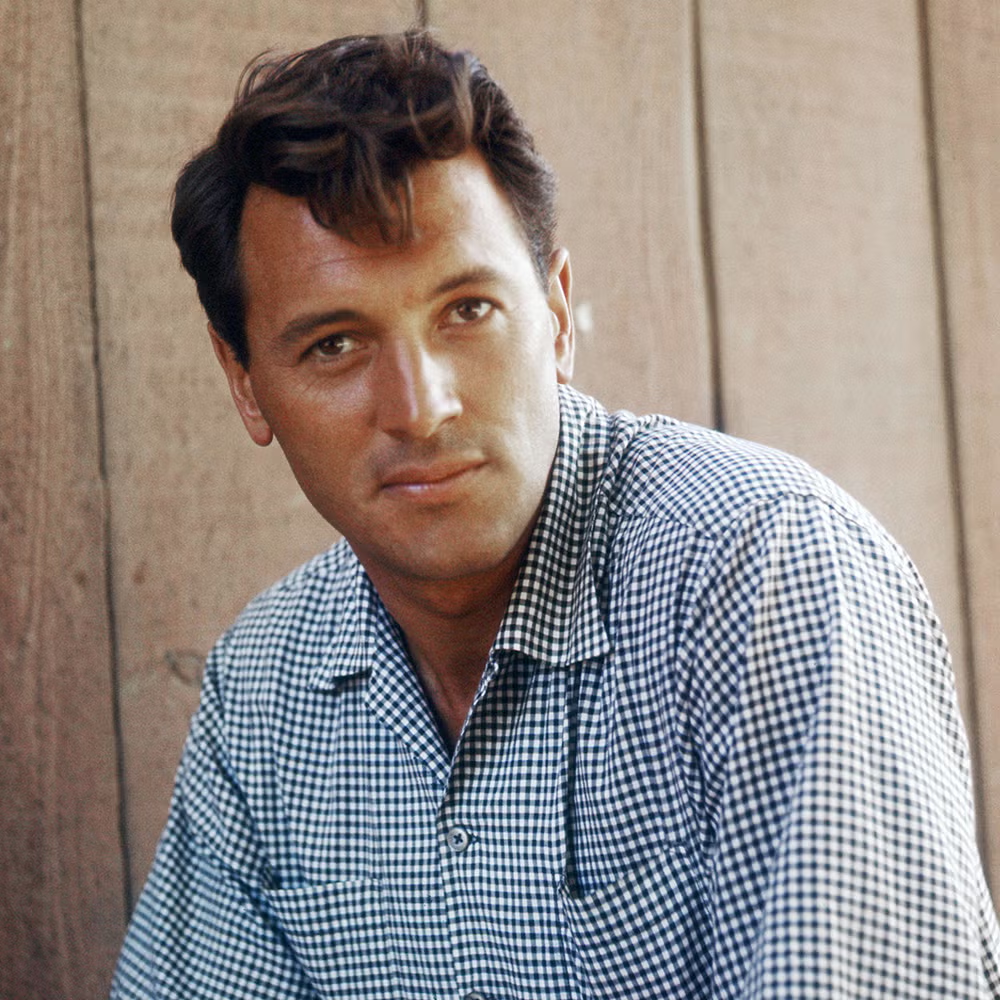
Table of Contents
Who Was Rock Hudson?
Rock Hudson, an iconic actor of the mid-20th century, is best remembered for his striking good looks and compelling performances on screen. His career reached new heights with his role in Giant (1956), where he starred alongside Hollywood legends Elizabeth Taylor and James Dean. Hudson gained further fame through his partnership with Doris Day in several successful romantic comedies, including Pillow Talk (1959), Lover Come Back (1961), and Send Me No Flowers (1964). In 1984, Hudson was diagnosed with AIDS and, a year later, became one of the first celebrities to publicly reveal both his homosexuality and his battle with the disease. He tragically passed away from AIDS-related complications on October 2, 1985, at the age of 59, becoming the first major celebrity to die from an AIDS-related illness.
Early Life
Born Roy Harold Scherer Jr. on November 17, 1925, in Winnetka, Illinois, Hudson faced early challenges. His father, Roy Harold Scherer, lost his job during the Great Depression and left the family, and when Hudson was eight, his mother remarried, leading him to adopt the surname of his stepfather, Wallace Fitzgerald. Academically, Hudson struggled, but his natural charisma and charm made him popular among his peers.
Hollywood and Early Success
In 1944, Hudson enlisted in the U.S. Navy and served in the Philippines during World War II. After his discharge in 1946, he moved to Hollywood with aspirations of becoming an actor. While working as a truck driver, he spent his free time networking at the studios and handing out headshots. His good looks and charm soon caught the attention of talent scout Henry Wilson, who signed him in 1947 and gave him the name “Rock Hudson,” a combination of “Rock” (from the Rock of Gibraltar) and “Hudson” (from the Hudson River).
Hudson’s early career was challenging due to his lack of formal acting training. However, after securing a contract with Warner Brothers and appearing in the film Fire Squadron (1948), Hudson’s potential was realized. Universal Pictures later took over his contract and provided him with acting lessons, helping him refine his craft.
Acclaimed Actor and Oscar Nomination for Giant
Hudson’s breakthrough came with Douglas Sirk’s Magnificent Obsession (1954), which marked the start of his rise to stardom. He further cemented his status as a leading man with Giant (1956), for which he received an Academy Award nomination for his performance. His success continued with a series of romantic comedies opposite Doris Day, beginning with Pillow Talk (1959). Hudson became a beloved heartthrob, admired for his charm and good looks.
In 1966, Hudson took on a more unconventional role in the science fiction thriller Seconds by John Frankenheimer. Though the film was not a box-office success, it demonstrated his versatility as an actor.
Television Career and Later Years
In 1971, Hudson joined the cast of the popular television series McMillan & Wife, and in the 1980s, he made appearances on the soap opera Dynasty. Despite his transition to television, Hudson’s health was deteriorating due to his battle with AIDS.
Personal Life and AIDS Diagnosis
In 1955, Hudson married aspiring actress Phyllis Gates in a marriage arranged by his agent, Henry Wilson, to maintain a public façade. The marriage lasted only three years and ended while Hudson was in Italy filming A Farewell to Arms (1957). Despite this, Hudson’s private life was marked by his relationships with men, though he kept his sexuality hidden due to the social stigma of the time.
In June 1984, Hudson sought medical help for an irritation on his neck, which was later diagnosed as a lesion caused by Kaposi sarcoma, a form of cancer associated with AIDS. On July 25, 1985, Hudson publicly announced his diagnosis, making him one of the first major public figures to reveal both his homosexuality and his AIDS status. This disclosure played a significant role in raising awareness about the AIDS epidemic.
Hudson spent his final months surrounded by family and friends before passing away on October 2, 1985. His death marked a turning point in the public’s understanding of AIDS, as he was the first major celebrity to die from the disease. Today, Rock Hudson is remembered not only for his contributions to film but also for his bravery in sharing his personal struggle with the world.
